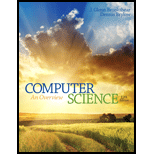
Computer Science: An Overview (12th Edition)
12th Edition
ISBN: 9780133760064
Author: Glenn Brookshear, Dennis Brylow
Publisher: PEARSON
expand_more
expand_more
format_list_bulleted
Question
Chapter 12, Problem 52CRP
Program Plan Intro
Factor:
The factor of any whole number is that number or quantity that results in producing the same whole number when multiplied with other.
Expert Solution & Answer
Want to see the full answer?
Check out a sample textbook solution
Students have asked these similar questions
I want to solve 13.2 using matlab please help
a) Show a possible trace of the OSPF algorithm for computing the routing table in Router 2 forthis network.b) Show the messages used by RIP to compute routing tables.
using r language to answer question 4 Question 4: Obtain a 95% standard normal bootstrap confidence interval, a 95% basic bootstrap confidence interval, and a percentile confidence interval for the ρb12 in Question 3.
Chapter 12 Solutions
Computer Science: An Overview (12th Edition)
Ch. 12.1 - Prob. 1QECh. 12.1 - Prob. 2QECh. 12.1 - Prob. 3QECh. 12.1 - Prob. 4QECh. 12.2 - Prob. 1QECh. 12.2 - Prob. 2QECh. 12.2 - Prob. 3QECh. 12.2 - Prob. 4QECh. 12.2 - Prob. 5QECh. 12.3 - Prob. 1QE
Ch. 12.3 - Prob. 3QECh. 12.3 - Prob. 5QECh. 12.3 - Prob. 6QECh. 12.4 - Prob. 1QECh. 12.4 - Prob. 2QECh. 12.4 - Prob. 3QECh. 12.5 - Prob. 1QECh. 12.5 - Prob. 2QECh. 12.5 - Prob. 4QECh. 12.5 - Prob. 5QECh. 12.6 - Prob. 1QECh. 12.6 - Prob. 2QECh. 12.6 - Prob. 3QECh. 12.6 - Prob. 4QECh. 12 - Prob. 1CRPCh. 12 - Prob. 2CRPCh. 12 - Prob. 3CRPCh. 12 - In each of the following cases, write a program...Ch. 12 - Prob. 5CRPCh. 12 - Describe the function computed by the following...Ch. 12 - Describe the function computed by the following...Ch. 12 - Write a Bare Bones program that computes the...Ch. 12 - Prob. 9CRPCh. 12 - In this chapter we saw how the statement copy...Ch. 12 - Prob. 11CRPCh. 12 - Prob. 12CRPCh. 12 - Prob. 13CRPCh. 12 - Prob. 14CRPCh. 12 - Prob. 15CRPCh. 12 - Prob. 16CRPCh. 12 - Prob. 17CRPCh. 12 - Prob. 18CRPCh. 12 - Prob. 19CRPCh. 12 - Analyze the validity of the following pair of...Ch. 12 - Analyze the validity of the statement The cook on...Ch. 12 - Suppose you were in a country where each person...Ch. 12 - Prob. 23CRPCh. 12 - Prob. 24CRPCh. 12 - Suppose you needed to find out if anyone in a...Ch. 12 - Prob. 26CRPCh. 12 - Prob. 27CRPCh. 12 - Prob. 28CRPCh. 12 - Prob. 29CRPCh. 12 - Prob. 30CRPCh. 12 - Prob. 31CRPCh. 12 - Suppose a lottery is based on correctly picking...Ch. 12 - Is the following algorithm deterministic? Explain...Ch. 12 - Prob. 34CRPCh. 12 - Prob. 35CRPCh. 12 - Does the following algorithm have a polynomial or...Ch. 12 - Prob. 37CRPCh. 12 - Summarize the distinction between stating that a...Ch. 12 - Prob. 39CRPCh. 12 - Prob. 40CRPCh. 12 - Prob. 41CRPCh. 12 - Prob. 42CRPCh. 12 - Prob. 43CRPCh. 12 - Prob. 44CRPCh. 12 - Prob. 46CRPCh. 12 - Prob. 48CRPCh. 12 - Prob. 49CRPCh. 12 - Prob. 50CRPCh. 12 - Prob. 51CRPCh. 12 - Prob. 52CRPCh. 12 - Prob. 1SICh. 12 - Prob. 2SICh. 12 - Prob. 3SICh. 12 - Prob. 4SICh. 12 - Prob. 5SICh. 12 - Prob. 6SICh. 12 - Prob. 7SICh. 12 - Prob. 8SI
Knowledge Booster
Similar questions
- using r language Obtain a bootstrap t confidence interval estimate for the correlation statistic in Example 8.2 (law data in bootstrap).arrow_forwardusing r language Compute a jackknife estimate of the bias and the standard error of the correlation statistic in Example 8.2.arrow_forwardusing r languagearrow_forward
- using r languagearrow_forwardThe assignment here is to write an app using a database named CIT321 with a collection named students; we will provide a CSV file of the data. You need to use Vue.js to display 2 pages. You should know that this assignment is similar, all too similar in fact, to the cars4sale2 example in the lecture notes for Vue.js 2. You should study that program first. If you figure out cars4sale2, then program 6 will be extremely straightforward. It is not my intent do drop a ton of new material here in the last few days of class. The database contains 51 documents. The first rows of the CSV file look like this: sid last_name 1 Astaire first_name Humphrey CIT major hrs_attempted gpa_points 10 34 2 Bacall Katharine EET 40 128 3 Bergman Bette EET 42 97 4 Bogart Cary CIT 11 33 5 Brando James WEB 59 183 6 Cagney Marlon CIT 13 40 GPA is calculated as gpa_points divided by hrs_attempted. GPA points would have been arrived at by adding 4 points for each credit hour of A, 3 points for each credit hour of…arrow_forwardI need help to solve the following case, thank youarrow_forward
arrow_back_ios
SEE MORE QUESTIONS
arrow_forward_ios
Recommended textbooks for you
 C++ Programming: From Problem Analysis to Program...Computer ScienceISBN:9781337102087Author:D. S. MalikPublisher:Cengage Learning
C++ Programming: From Problem Analysis to Program...Computer ScienceISBN:9781337102087Author:D. S. MalikPublisher:Cengage Learning C++ for Engineers and ScientistsComputer ScienceISBN:9781133187844Author:Bronson, Gary J.Publisher:Course Technology Ptr
C++ for Engineers and ScientistsComputer ScienceISBN:9781133187844Author:Bronson, Gary J.Publisher:Course Technology Ptr Systems ArchitectureComputer ScienceISBN:9781305080195Author:Stephen D. BurdPublisher:Cengage Learning
Systems ArchitectureComputer ScienceISBN:9781305080195Author:Stephen D. BurdPublisher:Cengage Learning Operations Research : Applications and AlgorithmsComputer ScienceISBN:9780534380588Author:Wayne L. WinstonPublisher:Brooks ColeProgramming Logic & Design ComprehensiveComputer ScienceISBN:9781337669405Author:FARRELLPublisher:Cengage
Operations Research : Applications and AlgorithmsComputer ScienceISBN:9780534380588Author:Wayne L. WinstonPublisher:Brooks ColeProgramming Logic & Design ComprehensiveComputer ScienceISBN:9781337669405Author:FARRELLPublisher:Cengage EBK JAVA PROGRAMMINGComputer ScienceISBN:9781337671385Author:FARRELLPublisher:CENGAGE LEARNING - CONSIGNMENT
EBK JAVA PROGRAMMINGComputer ScienceISBN:9781337671385Author:FARRELLPublisher:CENGAGE LEARNING - CONSIGNMENT

C++ Programming: From Problem Analysis to Program...
Computer Science
ISBN:9781337102087
Author:D. S. Malik
Publisher:Cengage Learning

C++ for Engineers and Scientists
Computer Science
ISBN:9781133187844
Author:Bronson, Gary J.
Publisher:Course Technology Ptr

Systems Architecture
Computer Science
ISBN:9781305080195
Author:Stephen D. Burd
Publisher:Cengage Learning

Operations Research : Applications and Algorithms
Computer Science
ISBN:9780534380588
Author:Wayne L. Winston
Publisher:Brooks Cole

Programming Logic & Design Comprehensive
Computer Science
ISBN:9781337669405
Author:FARRELL
Publisher:Cengage

EBK JAVA PROGRAMMING
Computer Science
ISBN:9781337671385
Author:FARRELL
Publisher:CENGAGE LEARNING - CONSIGNMENT